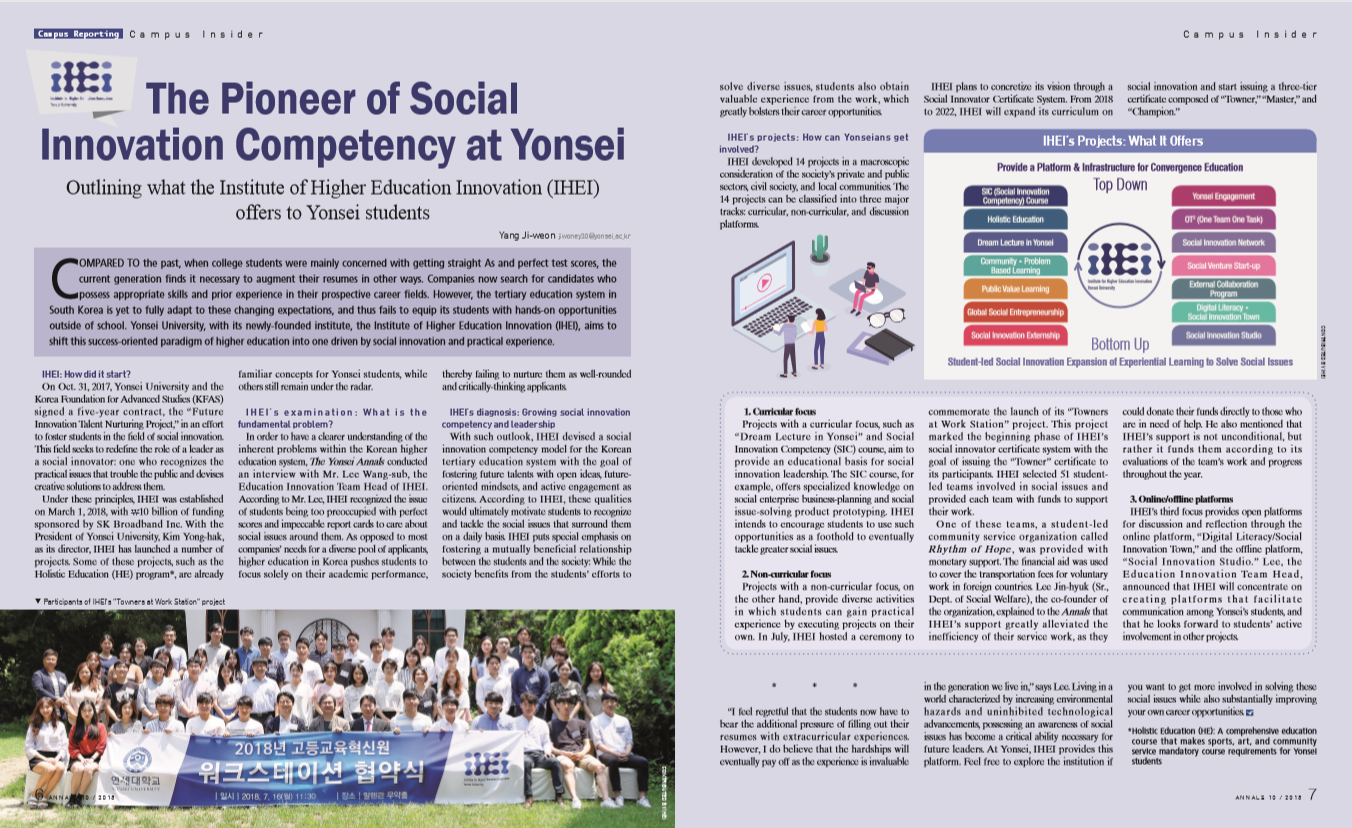Outlining what the Institute of Higher Education Innovation (IHEI) offers to Yonsei students

COMPARED TO the past, when college students were mainly concerned with getting straight As and perfect test scores, the current generation finds it necessary to augment their resumes in other ways. Companies now search for candidates who possess appropriate skills and prior experience in their prospective career fields. However, the tertiary education system in South Korea is yet to fully adapt to these changing expectations, and thus fails to equip its students with hands-on opportunities outside of school. Yonsei University, with its newly-founded institute, the Institute of Higher Education Innovation (IHEI), aims to shift this success-oriented paradigm of higher education into one driven by social innovation and practical experience.
IHEI: How did it start?
On Oct. 31, 2017, Yonsei University and the Korea Foundation for Advanced Studies (KFAS) signed a five-year contract, the “Future Innovation Talent Nurturing Project,” in an effort to foster students in the field of social innovation. This field seeks to redefine the role of a leader as a social innovator: one who recognizes the practical issues that trouble the public and devises creative solutions to address them.
Under these principles, IHEI was established on March 1, 2018, with 10 billion won of funding sponsored by SK Broadband Inc. With the President of Yonsei University, Kim Yong-hak, as its director, IHEI has launched a number of projects. Some of these projects, such as the Holistic Education (HE) program*, are already familiar concepts for Yonsei students, while others still remain under the radar.
IHEI’s examination: What is the fundamental problem?
In order to have a clearer understanding of the inherent problems within the Korean higher education system, The Yonsei Annals conducted an interview with Mr. Lee Wang-sub, the Education Innovation Team Head of IHEI. According to Mr. Lee, IHEI recognized the issue of students being too preoccupied with perfect scores and impeccable report cards to care about social issues around them. As opposed to most companies’ needs for a diverse pool of applicants, higher education in Korea pushes students to focus solely on their academic performance, thereby failing to nurture them as well-rounded and critically-thinking applicants.
IHEI’s diagnosis: Growing social innovation competency and leadership
With such outlook, IHEI devised a social innovation competency model for the Korean tertiary education system with the goal of fostering future talents with open ideas, future-oriented mindsets, and active engagement as citizens. According to IHEI, these qualities would ultimately motivate students to recognize and tackle the social issues that surround them on a daily basis. IHEI puts special emphasis on fostering a mutually beneficial relationship between the students and the society: While the society benefits from the students’ efforts to solve diverse issues, students also obtain valuable experience from the work, which greatly bolsters their career opportunities.
IHEI plans to concretize its vision through a Social Innovator Certificate System. From 2018 to 2022, IHEI will expand its curriculum on social innovation and start issuing a three-tier certificate composed of “Towner,” “Master,” and “Champion.”
IHEI’s projects: How can Yonseians get involved?
IHEI developed 14 projects in a macroscopic consideration of the society’s private and public sectors, civil society, and local communities. The 14 projects can be classified into three major tracks: curricular, non-curricular, and discussion platforms.
1. Curricular focus
Projects with a curricular focus, such as “Dream Lecture in Yonsei” and Social Innovation Competency (SIC) course, aim to provide an educational basis for social innovation leadership. The SIC course, for example, offers specialized knowledge on social enterprise business-planning and social issue-solving product prototyping. IHEI intends to encourage students to use such opportunities as a foothold to eventually tackle greater social issues.
2. Non-curricular focus
Projects with a non-curricular focus, on the other hand, provide diverse activities in which students can gain practical experience by executing projects on their own. In July, IHEI hosted a ceremony to commemorate the launch of its “Towners at Work Station” project. This project marked the beginning phase of IHEI’s social innovator certificate system with the goal of issuing the “Towner” certificate to its participants. IHEI selected 51 student-led teams involved in social issues and provided each team with funds to support their work.
One of these teams, a student-led community service organization called Rhythm of Hope, was provided with monetary support. The financial aid was used to cover the transportation fees for voluntary work in foreign countries. Lee Jin-hyuk (Sr., Dept. of Social Welfare), the co-founder of the organization, explained to the Annals that IHEI’s support greatly alleviated the inefficiency of their service work, as they could donate their funds directly to those who are in need of help. He also mentioned that IHEI’s support is not unconditional, but rather it funds them according to its evaluations of the team’s work and progress throughout the year.
3. Online/offline platforms
IHEI’s third focus provides open platforms for discussion and reflection through the online platform, “Digital Literacy/Social Innovation Town,” and the offline platform, “Social Innovation Studio.” Lee, the Education Innovation Team Head, announced that IHEI will concentrate on creating platforms that facilitate communication among Yonsei’s students, and that he looks forward to students’ active involvement in other projects.
* * *
“I feel regretful that the students now have to bear the additional pressure of filling out their resumes with extracurricular experiences. However, I do believe that the hardships will eventually pay off as the experience is invaluable in the generation we live in,” says Lee. Living in a world characterized by increasing environmental hazards and uninhibited technological advancements, possessing an awareness of social issues has become a critical ability necessary for future leaders. At Yonsei, IHEI provides this platform. Feel free to explore the institution if you want to get more involved in solving these social issues while also substantially improving your own career opportunities.
*Holistic Education (HE): A comprehensive education course that makes sports, art, and community service mandatory course requirements for Yonsei students
Yang Ji-weon
jiwoney@yonsei.ac.kr

